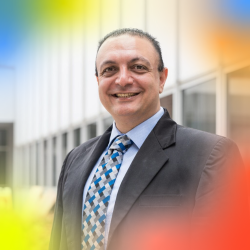With observations of National Hispanic Heritage Month kicking off on September 15, this year’s events will have special resonance for a team of Oregon Health & Science University (OHSU) researchers who are working to bring the benefits of clinical trials to more persons in underserved communities.
Eneida R. Nemecek, MD, MS, MBA, an endowed professor of pediatrics and medical oncology and Medical Director of Clinical Research at the Knight Cancer Institute of OHSU, recently received a $625,000, three-year grant from Genentech’s Health Equity & Diversity in STEM Innovation Fund to help close the gap between the 15% of Oregon’s population made up of Hispanics/Latinos and the only 5% of cancer patients in interventional clinical trials who come from that population.
Responding to questions from ACRP about the project, Nemecek noted that the Hispanic/Latino community is the fastest growing in Oregon, and that it is expected to double in the next 20 years.
“Cancer incidence in Latinos is on the rise,” Nemecek points out, “and their risk of poor outcomes and mortalities is high due to socioeconomic disparities. This also translates into lower participation in clinical trials. We wanted to challenge these trends by proposing a model to reach out to members of the Hispanic/Latino community to start a conversation about their understanding of cancer care and research, and to identify the challenges they face and potential solutions to optimize their access to cancer care and research opportunities.”
Socioeconomic challenges to high-quality cancer care and clinical trial participation include lack of awareness, suboptimal insurance coverage, distance to treatment centers, language, and other cultural barriers, Nemecek notes. “Healthcare systems have expected patients to adapt to overcome these challenges when, in reality, the best outcomes could be achieved by our institutions working to reduce or remove structural and systemic barriers to care for vulnerable, disadvantaged groups,” she says. “In order to do this, we need to approach our communities with humility and listen to what they know, what they fear, what their needs are, and how do they think those needs can be met.”
With the Genentech Foundation’s backing, Nemecek and her team have conducted a field study to understand barriers to access to cancer care and research in the Hispanic/Latino community of Oregon. The first step involved a series of structured community conversations across Oregon where they gathered a group of community members to have an open conversation about cancer, ranging from general understanding to prevention, early detection, and diagnosis, and on to treatment and survivorship.
“We chose a variety of rural, suburban, and urban areas in Oregon with large concentrations of Hispanics/Latinos for this portion of the project,” Nemecek says. “The information from these forums was then used to create a series of educational audiovisual capsules covering cancer topics. The capsules will be made available publicly for video and audio use nationwide. We are working in partnership with a Latino media company and consulting with officials from several Latin American countries to disseminate this content. We hope access to this material will increase awareness among the Hispanic/Latino community about cancer-related topics in Oregon and beyond.”
Another step in the project involves the recruitment of a Hispanic/Latino patient navigator for OHSU. Nemecek says it is known that engaging a culturally mediated navigator increases patient engagement and may foster clinical trial participation.
“This person will be at the community health worker/nurse level and will work in close collaboration with other members of our team, including disease-specific patient nurse navigators and social workers, to deliver culturally sensitive care to our patients,” Nemecek explains. “The goal is not to duplicate any of the work other members of our team are doing, but to complement and enhance their work by providing an extra layer of support and cultural background for Hispanic/Latino patients. This person will be accessible to patients in need at the point of entry to reduce early barriers and challenges to obtain the best care we can deliver as part of a multidisciplinary team.”
OHSU is a logical focal point for this kind of project because not all cancer centers can claim a Hispanic/Latino clinical research medical director and clinical research operations director the way her institution can, Nemecek says. “This work is personal to us,” she adds. “We have lived the experience—ourselves or with our family members—of feeling disadvantaged at some point when accessing healthcare. We are starting with the Hispanic/Latino community, as it is the most impacted population in our region, but our ultimate goal is to take the lessons we learn with this project to expand to other communities in need in Oregon and abroad. It will take many more of us, throughout all cancer centers, to put a dent in the universe when it comes to equity in cancer care and research. This is just the beginning.”
For more information about the project, please visit news coverage from The Statesman Journal and OHSU News.
Edited by Gary Cramer



